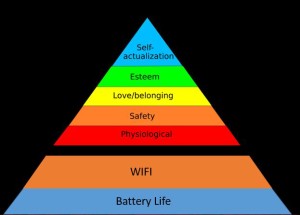As a high school junior, I got my first job working in a small independent bookstore. Our small staff loved each other, and what we did. I left school early to work each afternoon, and then on Saturdays. I have to admit that it was a great job – no sweating in the summer heat, or over a grill.
My job taught me a lot, and made me excited not just about the money, but about what I learned. Since then, my jobs have not all been that fun (painting the behind urinals at a local prison) or easy (like scraping windows on the third story of scaffolding), but my first job taught me to love work, and to work hard.
How to help your child thrive at their first job.
1. Clarify priorities.

Photo courtesy of Aaron Robert Photography. www.aaronrobertphotography.com Copyright 2014.
The ability to make decisions based upon priorities is important skill as many will go to college where the academic and social options are endless. Guide your child as they set their priorities. One parent states: “We encourage(d) our kids to prioritize: God, family, school, athletics & activities and finally work.” Whether or not you agree with this family’s priorities, the discussion of priorities is essential.
When different opportunities arise (like school, work, or sports), adolescents need to learn the ability to say no to certain activities based on their priorities. One Emerging Adult reflects on how their choice to work affected other areas of their life. “For me, work took the place of several extra-curricular activities.” Do not allow your children to participate in everything, but force them to make choices at they get older.
2. Set boundaries.
When adding a new role as worker (or employee), it is important for adolescents to set boundaries. While vocational development and earning money may be important, it is not the only piece of your child’s development. Therefore parents must help adolescents choose and uphold boundaries.
Here are some questions to discuss with your child:
a. Will your child be allowed to work during family worship time?
b. Will your child be allowed to miss other church activities? (Like youth group or retreats.)
c. When will your child have access to a car?
d. What hours/days of the week will your child be allowed to work?
e. Are there restrictions on how paychecks will be spent?
f. Who is responsible to pay for gas, insurance for the car?
One family described their rules, “[Our children] couldn’t work more than 15 hours a week. They had to keep their grades up, to tithe (however much God led them to), and to save a little from each paycheck.
When a child [or their workplace] crosses a boundary, a parent has the right to enforce them. This is not interfering, but parenting. A parent does hold the ability to tell an adolescent that they can no longer work. While living with their parents, our children need to know that holding a job, like all other adolescent activities is a privilege, and not their right. Like other privileges, this freedom can be removed.
3. Discuss expectations.

© 2011 DVIDSHUB, Flickr | CC-BY | via Wylio
We all have expectations in life. Sometimes adolescents know and communicate these expectation, but at others times they are hidden. If you want your child’s first work experience to be a success, discuss their expectations. Ask your child what they expect in the areas of pay, hours, the type of work, the work environment, and their interactions with others. If their expectations are unrealistic, help them research the facts on-line, rather than simply bursting their bubble. Help them envision and define what success will look like for them whether it is becoming a manager, or making a friend.
Not everyone will have a dream job while in high school, but it can be a positive experience when priorities are established, expectations are discussed, and boundaries are set. So whether your child is digging dirt, flipping burgers, or selling books – guide them in how to have a healthy perspective of vocation.
Dr. G. David Boyd is the Founder and Managing Director of EA Resources. He is thankful for all those who helped him survive and thrive during his vocational journey.










 Are you in a job that isn’t what you had always dreamed about? Here is an
Are you in a job that isn’t what you had always dreamed about? Here is an 



 I found this great
I found this great  I recently came across an
I recently came across an  Summer is here, and many young adults are looking for a job. While many jobs are already taken (Sorry, but you should have started a little sooner!), here is an
Summer is here, and many young adults are looking for a job. While many jobs are already taken (Sorry, but you should have started a little sooner!), here is an 
